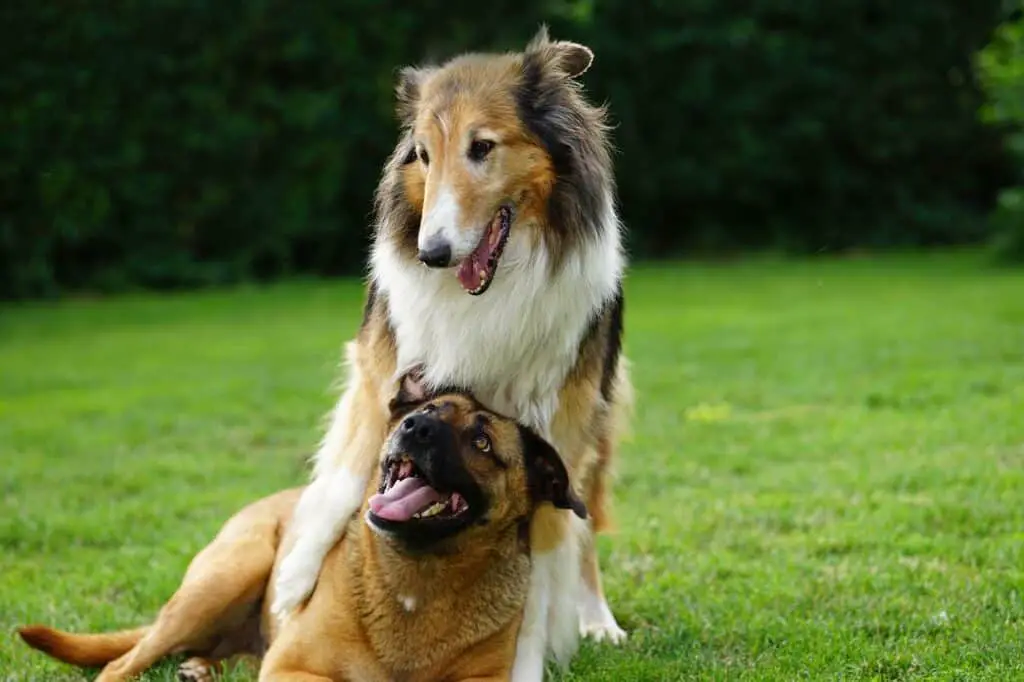Chewing on bones has several benefits for your furry friend, like promoting dental health, releasing endorphins, and providing nutritional supplements.
These factors would make you believe that all bone varieties, including ham bones, are safe for them but are they?
So, can dogs have a ham bone?
No. Ham bones are unsafe for dogs because their brittle nature makes them easily break into sharp splinters when chewed.
These fragments then hurt your pup’s sensitive digestive system during ingestion.
However, there are several guidelines you could follow to increase their chances of survival if they ingest a ham bone accidentally.
Herein is an in-depth look at the risks of dogs having ham bones.
It will also look at tips on caring for your furry friend when they consume these treats.

What happens if dogs eat ham bones
Below are some risks your pup may encounter if they have a ham bone.
Intestinal obstruction
A ham bone’s splinters could cause injuries in your dog’s stomach, esophagus, and mouth.
On the other hand, if swallowed whole, ham bones could lead to blood flow defects and intestinal blockage.
These conditions are deadly to dogs and would require immediate surgery.
Perforation
If your pup has a ham bone, it may break into sharp fragments that poke holes in their digestive tract or other body organs leading to internal bleeding.
These bones are also massive and thus break into hundreds of splinters, making many perforations in dogs’ digestive systems.
Peritonitis
Peritonitis is the inflammation of the abdominal wall membrane caused by a hole or leakage in the intestines.
This condition can be fatal and requires immediate surgery.
Therefore, since ham bone splinters cause perforations in dogs’ digestive systems, keeping these treats away from your pup is best.
Stomach upsets
A ham bone has high amounts of fat, causing stomach upsets in dogs.
These could lead to side effects like diarrhea, vomiting, and lethargy.

Symptoms to look out for when dogs eat ham bones
It’s vital to look out for the following symptoms if your pooch accidentally ingests a ham bone.
This is because they could be an indication of a severe health condition.
Lethargy
If your furry friend is not active as usual, the high chances are that they may have an infection that’s making their muscles weak and affecting their energy levels.
Infections can quickly develop into severe conditions.
Therefore, take your dog to the vet immediately in such a scenario.
Vomiting
Throwing up signifies that your pup is trying to get rid of something stuck in its digestive system.
Although your four-legged friend might be able to vomit the piece of ham bone, it’s advisable to see the vet still since the bone could have damaged their bodies.
Poor appetite
Lack of appetite after your furry friend has ingested a ham bone indicates that it’s stuck inside and preventing them from eating.
It might also be a sign of infections or gum inflammation.
Bloody stools
Blood in dogs’ stool could mean that they have injuries in their rectums caused by a foreign object like a ham bone splinter.
Therefore, it’s only fitting to rush your furry best friend to the vet if you notice a black or bloody stool.
Mouth discomfort
Mouth discomfort indicates that some ham bone splinters have gotten into your pup’s gums, causing pain.
This would make it hard for them to eat, and thus you should contact the vet immediately.
What to do if dogs eat ham bones
The following are steps you could take to ensure your pooch survives after having a ham bone.
- Feeding them bread – Bread coats the bone splinters, reducing the harm they cause. It will also help the fragments easily get through your dog’s digestive system.
- Giving them pumpkin – Pumpkin will soothe their stomachs and thus curb diarrhea. Additionally, it increases the stool bulk allowing it to pass through dogs’ systems smoothly.
- Contact the vet immediately – Ham bone splinters can cause irredeemable damage. Thus, call the vet immediately for directions to avoid your puppy suffering dire consequences.
Are cooked ham bones safe for my dog?
Although the large juicy ham bone on your plate may seem like a perfect treat for your pooch, it’s not the best option for them.
This is because cooked ham bones are more brittle than their raw counterparts, meaning they break into thousands of splinters, leading to extreme gastrointestinal tract damage.
Dogs will also showcase the following symptoms after taking cooked ham bones.
- Mouth lacerations
- Bacterial infections
- Constipation
- Broken teeth
- Suffocation
Alternative safe raw bones for dogs
If you enjoy the euphoric look on your pup’s face as they chew on a bone, below are alternatives they can easily break down.
- Beef
- Lamb
- Chicken
- Turkey
Can my dog eat store-bought ham bones?
These canines should never indulge in store-bought ham bones as they are high in sodium.
Excess sodium causes dehydration which could quickly escalate to kidney failure or even death in dogs.
Store-bought ham bones are also mostly cooked and thus easily break into many splinters, causing extreme gastrointestinal damage in dogs.
Can my dog eat ham?
Your four-legged friend can eat ham as it’s a great source of protein.
However, they can only indulge in this treat moderately because it has high amounts of sodium, fat, and calories.
When ingested in high amounts, these ingredients cause severe health conditions like kidney failure, obesity, and pancreatitis.
Frequently asked questions (FAQs)
What kinds of bones are safe for my dog?
Raw and large bones are the best alternative treats for your pooch.
This is because they are hard to break into splinters and hence won’t cause lacerations.
Can my dog eat cured ham bones?
It’s not safe for dogs to eat cured ham bones.
These treats are usually smoked or salted and thus could lead to dehydration or kidney failure.
Can my dog have ham shank bones?
Dogs are not allowed to have ham shank bones as they are harder than their teeth.
Since they have difficulty chewing it, your four-legged friend might swallow it whole, causing a gastrointestinal blockage or damage to other internal organs.
Conclusion
Although your dog may enjoy indulging in them, ham bones are risky as they can lead to dire gastrointestinal damage.
Always opt for safe alternatives like turkey and lamb bones to make your pup happy.
- What Dog Breeds Have Pink Skin? - March 24, 2023
- What Are the Most Inspiring Dog Breeding Quotes? - March 20, 2023
- Can Pheromone Spray Help Improve Dog Breeding Results? - March 19, 2023








